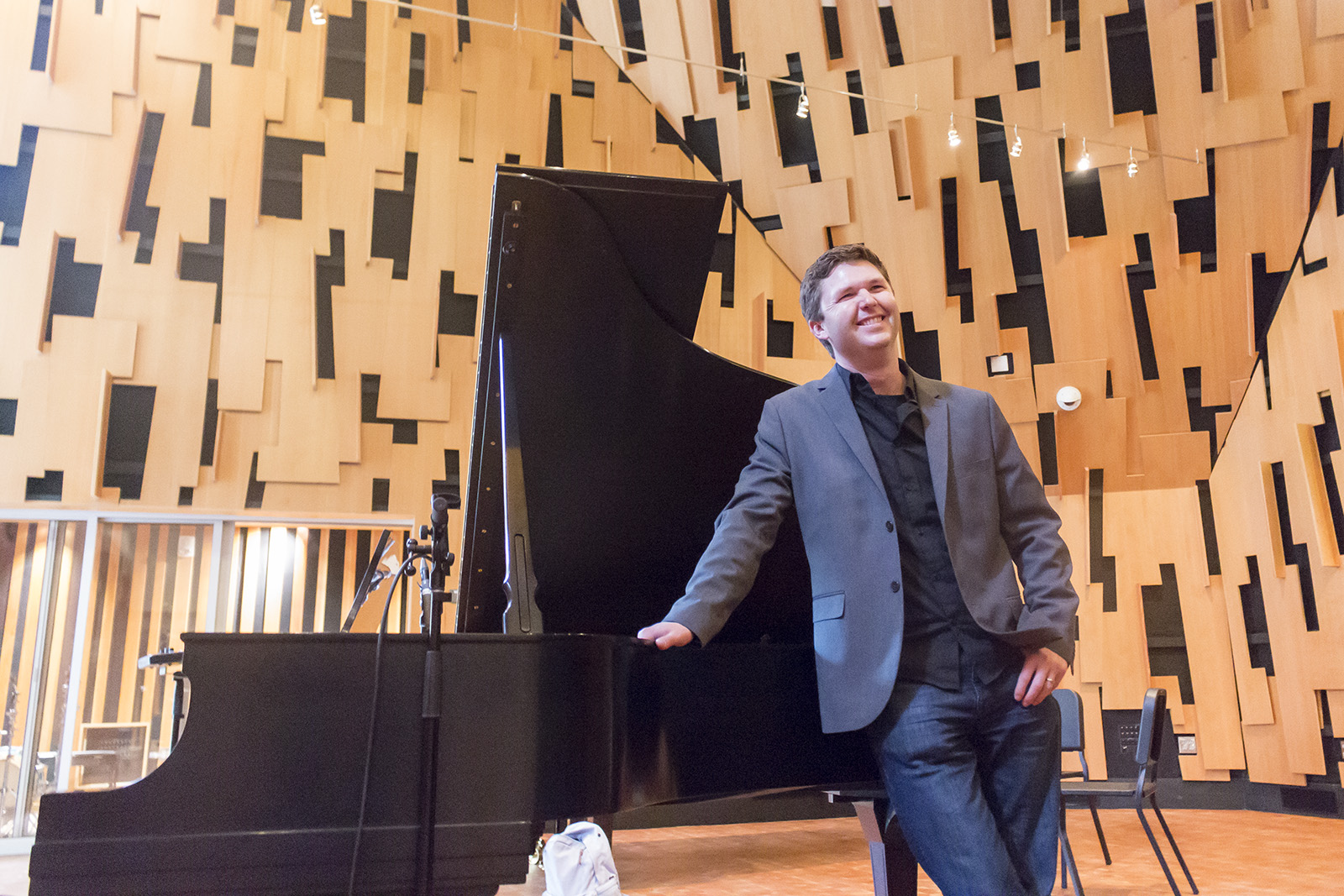UCLA music lecturer thrives on collaborative process of film scoring

Music lecturer Jonathan Beard has played different roles in creating music for films such as “Frank vs. God” and “Despicable Me 3.” As a composer, Beard collaborates with directors to generate a soundtrack; when he orchestrates a piece, he transfers detailed cues from the composer to an orchestra. (Hannah Johnson/Daily Bruin)
By Cameron Vernali
June 7, 2017 7:10 p.m.
Movie soundtracks sometimes fall into the background for movie viewers, but for Jonathan Beard they’re all he can focus on.
Beard, a lecturer in the UCLA Herb Alpert School of Music, helps create soundtracks for films and television shows. He orchestrated soundtracks for works including “The Handmaid’s Tale,” and “Despicable Me 3” and also composed the soundtrack for the film “Frank vs. God.”
While both composing and orchestrating music encompass similar skill sets and challenges, Beard said both roles require different responsibilities. When composing a soundtrack, Beard works with the director to create cues – choral pieces that play during specific parts of certain scenes. However, when Beard is orchestrating a soundtrack, he works on transferring already composed cues into a live setting with an orchestra.
“I could not be happier than with the balance I now have with both of these sides of the jobs,” Beard said. “They are both collaborative team jobs.”
Beard was trained as a classical cellist starting at age six, but began writing songs at around 10 years old when his older brother was in a rock band and they began recording songs together. This soon led into an interest in pop production and songwriting. Beard found that his interests in writing pop songs and playing classical music met in the field of film score production.
When composing the soundtrack for a film, Beard said he has to take more of a leadership role, talking directly to the director in order to figure out where the director wants cues in the movie, as well as the emotion he or she wants to emphasize at certain points throughout the movie.
Beard also has a more creative role when composing. While composing the soundtrack for “Frank vs. God,” Beard had to have multiple conversations with the director Stewart Schill in order to solidify the vision he had for the soundtrack. Schill said he wanted the music to be understated and act as a guide for the viewer throughout the movie.
“(I think), ‘What can I do to give these little moments the poignance or the depth that they need?’” Beard said.
“Frank vs. God” was a tonally challenging film due to the fact that it starts off as a comedy but ends as a spiritual love story, Schill said. Beard’s ability to express the mood helped emphasize the varying tones of the film.
In the film, protagonist David Frank’s late wife played the cello, so Beard chose to musically represent her by including a distant and dreamy solo cello in the score.
“We had a really similar sensibility, so I really trusted him as a person and as a collaborator,” Schill said. “He just took all of the music ideas for the soundtrack and made it sound really cohesive and organic.”
Edward Trybek, Beard’s work partner, said he enjoys orchestrating Beard’s compositions because he appreciates Beard’s talent as a composer and his ability to create cohesive and talented cues.
“It was a very enjoyable process to be focused on what he wanted us to do personally,” Trybek said
When he is orchestrating, Beard has a slightly different task. Instead of helping create a soundtrack from scratch, he takes a demo version of cues that have already been created by a composer and brings them to life with an orchestra.
The amount of work that orchestrators do can vary from project to project. For example, when Beard orchestrated the soundtrack for “Despicable Me 3,” the composer, Heitor Pereira, gave Beard precise demo versions of the cues. The detailed cues helped Beard know which musical emotions to highlight.
In both composing and orchestrating, time is a challenge for Beard. While the time frame for a soundtrack differs from project to project, it is often out of his control. When working on “Despicable Me 3,” the music was still changing as they were recording it, he said.
Since composers do not have enough time to do all of the tasks themselves, they must rely on orchestrators and others in the process to help complete the vision for the soundtrack, Beard said.
But in both positions, Beard said he enjoys the collaborative nature of scoring.
“Either way, I get to be part of a really special team that is helping to serve something that is larger than ourselves,” Beard said. “In many ways, that is the single most important part of doing any of this work.”

